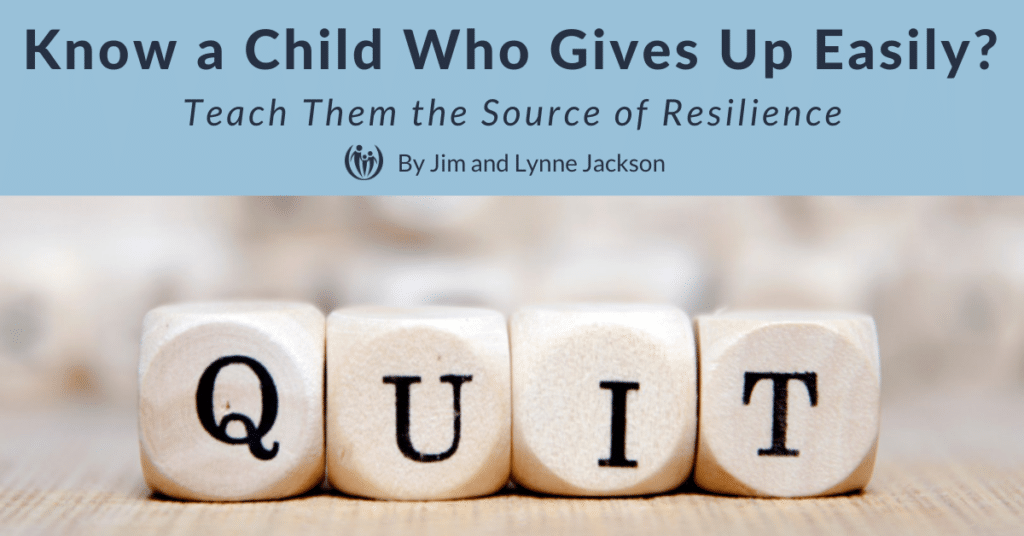
Know a Child Who Gives Up Easily? Teach Them the Source of Resilience

“It’s too hard!” “I can’t do it!” “I’ll never be good at it!” “I give up!” You may have heard words like these as you watch when your child gives up easily. You wince because you don’t want your child to quit when things get complicated. You want your child to learn to persevere and to face life with grit and resilience. To be able to do hard things. But some kids struggle with giving up more than other kids.
- Maybe your child’s personality leans toward the perfectionist side. It’s hard to accept a less-than-perfect outcome, so they give up as soon as they start to see imperfection.
- Maybe they just don’t care (and what’s to say they should?).
- Maybe your child has been mocked by other kids and doesn’t want to risk the vulnerability of failing again.
- Your child may sense your tendency to be a perfectionist and be afraid of not measuring up to your expectations.
- Your child doesn’t have the vocabulary to process all the overwhelming negative feelings they experience when they face a challenge.
- Perhaps your little one has never seen overcoming adversity modeled as a good or pleasurable process.
If any of this feels familiar, take a deep breath and resist the temptation to label your child a quitter. Instead, dive into what it takes to raise a child with the grit needed to tackle life’s twists and turns.
Two ingredients of overcoming: Resilience and grit
If you don’t want your child to give up as soon as the going gets tough, they’re going to need two important characteristics: resilience and grit.
What are resilience and grit?
- Merriam-Webster defines resilience as “an ability to recover from or adjust easily to misfortune or change.”
- Grit is “firmness of mind or spirit: unyielding courage in the face of hardship or danger.”
In short, it is about “bounce back” ability and courageous determination.
Why kids need resilience and grit
1. Because bad things will happen.
Jesus said, “In this world, you will have trouble.”
Right now maybe it’s just mastering long division or riding a bicycle. Perhaps it’s finishing their homework or practicing their spelling list. These challenges don’t feel like life-altering skills or major trials, do they? However, learning to persist is a life-altering skill for the significant trials that inevitably will come.
2. Because life won’t always be easy.
The kids that seem to master it all so easily—who excel at school and never need to study, who nail that backflip on the trampoline in just a couple of tries—these are the kids that may need your assistance the most in learning resilience. Life isn’t forcing resilience on them.
Consider what happens when resilience and perseverance are not learned.
For the child that hasn’t learned to persist, what happens when maintaining a friendship or marriage is hard work? Relationships won’t always be easy or natural, even if getting an A in mathematics was.
For adults who have never learned to cope with adversity while they were children, what happens when life itself feels overwhelming? Every person will face a stretch when the choice to get up and keep moving is an act of overcoming. Whether from grief, trauma, mental illness, job stress, or other circumstances, life won’t always be easy.
Educational expert Dr. Dan Peters sums it up well, “As we all know, it is not the smartest who are most successful in our world, it is those who persevere, adapt, problem solve, and don’t give up.” [sic]
“Fragile” sources of resilience when things are hard
When people give gritty and resilient effort to something, they might do it for the internal satisfaction of finishing a job well done. This is biblical and something you can encourage.
But if this becomes the primary motivator, kids may develop an inflated view of themselves and their performance as a source of value in life.
For some people, making an impression is the goal. This might mean there is no motivation if there is no audience. Their “perseverance” may be rooted in people-pleasing insecurity or jealousy and competition. For example, high-achieving kids often exhibit great diligence in their studies but are more susceptible to anxiety and depression because their success is rooted in their performance, and they don’t feel that they’ll be loved if they fail.
“Rock solid” reasons for not giving up in adversity
You probably desire to raise resilient, gritty, faith-filled kids who can overcome difficulties and challenges. At the end of the day, when you help kids learn the value of participating in God’s kingdom work, you give them a deeper reason for resilience than the world gives. You provide them with the purpose of learning, like the Apostle Paul, to “go through various trials,” “run the race to get the prize,” and “do all things through Christ who gives them strength!” That’s a profound reason to persist – so you don’t miss the joy of participating in what God is doing on earth.
I (Lynne) needed to adjust my perspective on “going through various trials” when our kids were in middle and high school…
We have a podcast about resilience!
Want to learn more about developing resilience and grit in your kids? Check out Episode 200: Reslience Children are Raised, Not Born for great insight and practical tips.
A camping story: learning to embrace adversity with a purpose
Yet again, another wilderness canoe trip had turned into a week of horrible weather.
Because of pervasive bad weather throughout each of our previous four trips, we had intentionally picked the “statistically best average weather week” of the summer: the last week in July. Ha.
This time, we were battered by a ferocious, relentless, and cold wind that threatened to blow away our tents and kept us trapped for four days on the same little island.
(We learned later that after months of unusually hot weather, this trip was on the exact four days of record-breaking continuous straight-line winds averaging 30-40 mph, with average temps in the 40s. At least it blew all the bugs away!)
The kids had been relatively resilient through all this, working hard and creating fun where there seemed to be none. They each knew that choosing this attitude was a blessing to all. But I was still frustrated.
Like many of the writers of the Psalms, I freely expressed my frustration at God. “Really? It’s been hot, sunny, and calm most of the summer, and we get rotten weather! Again. Why?”
At that moment, I remembered earlier in the trip, watching the collaborative effort of our kids and our friends’ kids. Together, they heroically wrestled the wind and canoed to the center of the little lake to get clean drinking water for the group. With that image God helped me answer my own question, “Because I’m raising overcomers!”
Was that God speaking to me? You never quite know, but I answered meekly, “Oh… good plan. Really good plan.” I shared this insight with the whole group later around the campfire, sipping hot coffee from the water they’d fetched. It was a holy moment as the kids seemed to embrace God’s good purposes to go through hard things for the benefit of others and building endurance “muscles” in the process.
In her book, Grit: The Power and Passion of Perseverance, Angela Duckworth explains that people motivated by altruism score higher on grit scales than those motivated by personal pleasure.
So why a camping story? Because it is a graphic illustration of an important principle: Adversity with a purpose is the best way to help our children learn to be resilient “overcomers.”
The ultimate example of true resilience
Knowing He was about to be arrested and crucified the next day, consider Jesus’ wrestling (Matthew 26:36-46) with submitting to the emotional, physical, and spiritual horror waiting for Him. What got Him through that? The joy of rescuing His children with His sacrifice.
When you follow Jesus, it will never be your responsibility to single-handedly save any situation or overcome any tragedy. Instead, you lean into Christ Jesus, who said, “I have overcome the world.” John 16:33
That’s it. Your deepest resilience lies in an unruffled confidence in that Truth as you persevere.
Teaching this resilience to your kids is a high calling as a parent. There are many thoughtful ways you can grow the values and skills that equip kids to be “overcomers” – kids who live a life of faith-filled perseverance.
3 key factors that develop a child’s resilience and grit
1. Strong connection with you
First off, connecting with your child is paramount (which is what we’re all about!) More than anything you do to explicitly teach resilience, research suggests the strength of your relationship with your child significantly impacts your child’s resilience during adolescence. In fact, the close relationship you build with your child early in life can often help you ride out the conflicts that adolescence may bring.
2. Healthy self-esteem
Secondly, it appears that resilience is affected by self-esteem. In fact, among homeless youth in New York City and Toronto, self-esteem emerged as a “key protective factor” against the stresses of homelessness.
To that end, wise parents will want to think through the messages their parenting (and especially their discipline) sends to their children. “I am loved” is a more resilient message than “I am a nuisance.” Healthy self-messages make up a healthy self-esteem.
Moreover, research also suggests that the happy medium for developing healthy self-esteem occurs when mothers (sorry, no research on fathers) are nurturing without becoming overprotective. Nurturing promotes the message: “You are LOVED.” Refraining from being overprotective promotes the message, “You are CALLED and CAPABLE.”
(If you read material from Connected Families very often, a lot of this will sound familiar.)
3. Serving others
Serving others and volunteering are also great ways to build kids’ resilience. One review of existing research summarized significant factors that impact children’s resilience during life transitions: “supportive families, positive peer relationships, external networks, and the opportunity to develop self-esteem and efficacy through valued social roles.”
Many researchers have demonstrated that people’s community involvement and service to others relate to their resilience and gratitude levels. For example, this study demonstrated the number of hours a student volunteers correlated with their self-perceived resilience.
A word of caution: In today’s competitive world, volunteering can be a shiny form of people-pleasing where kids pad their college resume, but as Christian parents, we can help kids value their God-given purpose of serving in love.
If we were to sum up the research, healthy, resilient kids are kids with close relationships, high positive expectations, and a sense of purpose and service.
The power of your example
This process of growing resilience in your kids starts with modeling resilience as you overcome your own personal challenges. As you model this and talk about your process, your kids can begin to see adversity as an opportunity for them to learn resilience themselves.
Look for ways to talk about resilience in the messes of daily life:
- What have been some challenging things you’ve overcome? What was your thought process? How did you keep going?
- When did you give up easily, what was the result, and how did you regroup?
- When you’re not good at something/your result isn’t perfect, can you debunk perfectionism and stay light-hearted, even joke about it?
A key challenge (a.k.a. opportunity for resilience) might be parenting a child who struggles with giving up easily! Can you stay peaceful and respond with creativity and encouragement when your child struggles? And lean into the truth that Jesus is for your family, and the Holy Spirit will guide you to grow resilience in you and your children!
Leaning into the encouraging, empowering presence of Jesus when things are difficult points your children toward the Source of a lifetime of resilience.
There’s hope! Let’s review…
If you know your child gives up too easily, don’t despair. We invite you to keep these principles in mind:
- Research suggests a close, connected relationship between you and your child is vital.
- Modeling resilience (out loud) is a powerful tool.
- Kids must experience appropriate-level challenges without anyone fixing them.
- You can give your child the best reason for good effort: “Jesus calls you to be a blessing to others!”
For more resources, this article builds on these principles with lots of practical ideas to teach resilience to your child who gives up easily.
© 2024, 2021, 2012 Connected Families

Do you have a child with BIG feelings and BIG needs?
The Sensitive & Intense Kids online course is a game changer. It’s for YOU.





